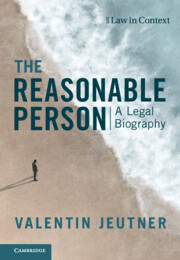Book contents
- The Reasonable Person
- Law in Context
- The Reasonable Person
- Copyright page
- Dedication
- Contents
- Acknowledgements
- Table of Cases
- Table of Legislation
- Introduction
- 1 The Reasonable Person in the Past
- 2 The Reasonable Person in Birmingham
- 3 The Reasonable Person in Clapham
- 4 The Reasonable Person in the Colonies
- 5 The Reasonable Person on the Battlefield
- 6 The Reasonable Person in the Future
- Conclusion
- Bibliography
- Index
3 - The Reasonable Person in Clapham
Published online by Cambridge University Press: 30 May 2024
- The Reasonable Person
- Law in Context
- The Reasonable Person
- Copyright page
- Dedication
- Contents
- Acknowledgements
- Table of Cases
- Table of Legislation
- Introduction
- 1 The Reasonable Person in the Past
- 2 The Reasonable Person in Birmingham
- 3 The Reasonable Person in Clapham
- 4 The Reasonable Person in the Colonies
- 5 The Reasonable Person on the Battlefield
- 6 The Reasonable Person in the Future
- Conclusion
- Bibliography
- Index
Summary
Chapter 3 focuses on the application of the reasonable person in the nineteenth and twentieth centuries. The chapter begins by considering why the reasonable person is frequently placed on means of public transport. It argues that the reasonable person’s presence on the omnibus means that others can see it and that the reasonable person itself sees others. The chapter then considers whether the standard of the reasonable person was meant to be an empirical standard or a standard controlled by the courts. It does so by asking whether the idea was that one could actually encounter the reasonable person on the Clapham omnibus. Contrasting the concept of the reasonable person with the concept of the average human person proposed by the Belgian sociologist and astronomer Adolphe Quetelet, the chapter establishes that the reasonable person was meant to be a court-controlled standard. Finally, the chapter shows how the standard has historically been construed exclusively in male terms. It addresses the discriminatory potential of the standard and acknowledges that the reasonable person concept has often been applied in a manner that excludes anyone who does not share the characteristics of the male, white, middle-aged judge who applies the standard.
Keywords
Information
- Type
- Chapter
- Information
- The Reasonable PersonA Legal Biography, pp. 59 - 79Publisher: Cambridge University PressPrint publication year: 2024
